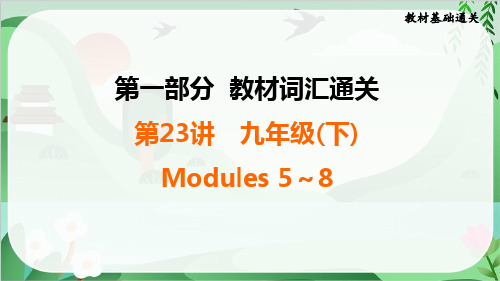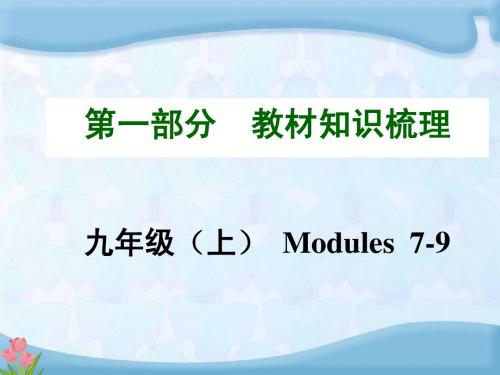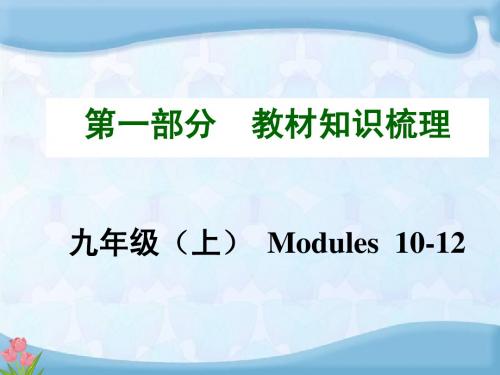中考英语考点聚焦九外研版-课件
2015年中考英语(安徽,外研版)语法专题突破 专题九 情态动词(共27张PPT)

专题九
语法专题突破
情态动词
考点精讲
考点一 情态动词的基本用法
情态动词本身有一定的意义,但不能独立作
谓语,没有人称和数的变化,后面必须接动词原 形。具体用法见下表:
情态动词
用法
例句
表示能力,意为
与be able to互换 表 示请求、允 许 , 意为“可以”
Sam
can
speak
“能、会” ,可 English well. 萨 姆
表示推测,意 She can’t be at home now can 为“可能”, because I saw her out.她 常用于否定句 这会儿不可能在家,我
和疑问句
看见她刚出去了。
情态动词
含义
例句
Lily
can’t “不可能”
can’t
be
at
home
because I saw her go out just now. 莉莉不可能在家,因为 我看到她刚才出去了。
要一杯茶吗?
情态动词
用法
表示主观看法, 意为“必须、应 该” must的否定式 mustn’t,表示
例句
You must finish your homework first! 你必须先完 成你的家庭作业! You mustn’t smoke here. 在这
must
“禁止,不允许”里不许抽烟。
情态动词
个大衣肯定是玛丽的,
因为上面有她的名字。
现学现用 1. — ____ you sing an English song? —Yes, I can.
A. Can
B. May
C. Must
D. Need
2025年外研版中考英语总复习教材知识点梳理第23讲九年级(下) Modules 5~8

7. serve v. 端上(食物和饮料),服侍……进餐 →_s_e_r_v_ic_e____ (n.)接待;服务 serve sb. sth. =serve sth. to sb.给某人提供/ 端上某物 Module 7
achieve v.达到;完成;成功 →_a_c_h_i_e_v_e_m_e_n_t__(n.)成就;成绩 _a_c_h_i_e_v_e_o_n_e_'_s_d_r_e_a_m____实现某人的梦想
Module 8 1. intend v. 计划;打算
_in__te_n_d__to__d_o__st_h_.__打算做某事 2. disappoint v. 使失望
→__d_is_a_p_p_o_i_n_t_e_d______(adj.)失望的; →_d_i_s_a_p_p_o_in__ti_n_g______(adj.)令人失望的 →_d_is_a_p_p_o_i_n_t_m_e_n_t_____(n.)失望 _t_o_o_n_e_'_s_d_i_sa_p_p__o_in_t_m__en__t _________令人失望的是
mine, so we become good friends.
一 二三 四五
3. My grandpa made a decision to give ____u_p_____ smoking for his health.
4. Thanks ___t_o______ the soldiers that are called “the Loveliest People” , we Chinese can live a peaceful life.
Байду номын сангаас
重点短语补充 1. _c_a_tc_h__u_p_____________ 赶上 2. _c_a_ll_o_f_f______________ 取消;决定终止 3. _t_h_a_n_k_s_t_o____________ 多亏;归功于 4. _h_e_a_lt_h__c_a_re___________ 医疗保健 (服务) 5. _o_n_c_e_i_n_a__w_h_i_l_e_______ 偶尔,有时,间或
2015年中考英语(安徽,外研版)教材知识梳理九年级(下)Modules1-4课件

◆used to do意为“过去常常做某事”, 只用于
过去时态,暗示现在不做了。to为不定式符号,
后面跟动词原形。如:He used to live in a small
பைடு நூலகம்
village, but now he has been used to living in a big
city.他过去住在一个小村庄里,但是现在他已经 习惯住在大城市里。
He is used to working hard. 他习惯于努力工作。
◆be used to do意义“被用来做某事”,其主语是 物,用动词use的被动语态,在这种结构里,to是
不定式符号,表目的。如:The book is used to
teach us how to write. 这本书教我们如何写作。
◆doubt作动词时,意为“怀疑”,在肯定句中后
面可接if或whether,在否定句及疑问句中可跟
that从句。 如: I doubt if /whether he will win. 我 怀疑他是否能赢。 Do you doubt that he will win? 你怀疑他会赢吗?
某事”。如: The performance was successful.
演出很成功。 Were you successful in finding a new house? 你 找到新房子了吗?
考点三 But people don’t take as much exercise as they used to.但是人们做运动不像往常那样多。 (P18) 【用法归纳】 辨析used to do, be/get used to doing与be used to do 的用法
2015年中考英语(安徽,外研版)教材知识梳理九年级(上)Modules7-9课件

◆suppose 有“猜想,假定”之意。常用短语: be supposed to do sth.意为“应当做某事,理应 做某事”;其否定形式为be not supposed to do
sth. 表示“不应当做某事”。如:He is supposed
to take care of his old father. 他理应照料他的老 父亲。
◆suppose 后跟宾语从句要否定前置,类似的动 词还有think, believe, imagine等。如:I don’t suppose it will rain tomorrow. 我认为明天不会
下雨。考点二 ຫໍສະໝຸດ accept that they’re similar because their
be made by...
意为“由„„(动作的执行
◆look like能够用来表达take after的意思,但 look like多指视觉上的相似。如:The photo doesn’t look like her at all.那张照片看上去一点
儿也不像她。
That bicycle looks just like the one I used to have. 那辆自行车跟我以前用的很像。
的。(P74) 【用法归纳】 辨析be made of与be made from
如:The kite is made of paper.风筝是用纸 做的。 Butter is made from milk.黄油是从牛奶中 提炼出来的。
拓展:be made的其它词组
be made in... 表示某产品在某地生产或制 造。
◆be like比look like的应用范围更大,可指 “品德、性格、相貌”等,而look like则常指相貌 “看起来像„„”。如:What’s your sister like?
2015年中考英语(安徽,外研版)教材知识梳理九年级(上)Modules10-12课件

◆add...to...意为“把„„加到„„”。如:If you add five to five, you get ten. 五加五得十。
考点四 Complete the passage with the correct form of the words in the box.用框中所给单词的 正确形式完成下列文章。(P91)
发生。如:—How soon will you go to USA? 你多
久之后去美国? —In a few days.几天以后吧。
◆how far“多远”, 用于对距离进行提问。如: How far is the new supermarket from here? 新
的超市距离这儿多远?
◆how many“多少”,后加可数名词复数。如: How many students are there in your class?你们 班有多少学生? ◆how much“多少”,后加不可数名词。如:
第一部分
教材知识梳理
九年级(上) Modules 10-12
考点精讲
考点一 Did you keep a diary while you were there?你在那里的时候坚持写日记吗?(P80)
【用法归纳】 keep的用法
◆keep用作连系动词, 构成系表结构:keep+表 语,意为“保持,继续(处于某种状态)”。其中表 语可用形容词、副词、介词短语等充当。如:You must look after yourself and keep healthy. 你必须照 顾好自己,保持身体健康。
forward. 你的忠告就是他保持上进的原因。
◆keep sb./ sth. from doing sth. 表示“阻止(防 止)某人/某物做某事”。如:The heavy rain kept the children from going out to play. 孩子们
中考外研版英语一轮复习课件:九年级上册Modules10~12

7. 比如 8. compared with 9. even though 10. congratulations to sb. (on sth. ) 11. throw away 12. change. . . into. . . 13. tons of 14. be in with a chance
3. difficulty n. 困难; 困境 【填一填 思维激活】
①I have a feeling that we can solve those
(小困
难).
②I have difficulty (in)
(understand) what he said.
③对我们来讲在半小时之内完成这项工作是很难的。
①
(向……祝贺)our winners and thanks to
everyone who entered the competition. ②——祝贺你通过了期末考试。
——非常谢谢你。
—
you
passing the final exam.
—Thank you very much. 答案: ①Congratulations to ②Congratulate; on
【核心词汇】
1. height n. 高度; 身高
【填一填 思维激活】 选词填空 high/height/highly 。
①What's its
?
②People all over the world speak
of Mo Yan's
novels. ③The mountain is very
. It's very difficult for us
动词, congratulate sb. on/upon (doing) sth. 为(做)某事向某人祝贺
中考英语总复习 第24讲 九年级下册 Modules 34课件 外研版

5.I'm happy to see she's busy working every day. 看到她每天忙于工作,我很高兴。 6.It's so difficult to cross the road. 过马路是那么困难。 7.Not all the changes are good ones. 并不是所有的变化都是好事。 8.More people drive cars instead of riding bikes. 更多的人开车,而不是骑自行车。 9.You must be careful of falling stones. 你必须当心(dāngxīn)下坠的石头。
You must look after yourself when I'm not at home. 我不在家的时候,你一定要照顾好你自己。
【拓展精析】
表示“某人自己的……”用one's own...,而不是用反身代词
。反身代词能作定语(dìngyǔ),可以作动词(介词)的宾语或同
位语。one's own后可接名词也可不接名词。of one's own意
。
第十六页,共29页。
【活学活用】
(3)—Do you like Zhou Libo's talk show?
—Yes.His talk show is very funny.It always makes people _A.
A.laugh
B.laughed
C.laughing
D.to laugh
第七页,共29页。
10.Whenever you go walking in the hills,you should always wear proper clothes.
- 1、下载文档前请自行甄别文档内容的完整性,平台不提供额外的编辑、内容补充、找答案等附加服务。
- 2、"仅部分预览"的文档,不可在线预览部分如存在完整性等问题,可反馈申请退款(可完整预览的文档不适用该条件!)。
- 3、如文档侵犯您的权益,请联系客服反馈,我们会尽快为您处理(人工客服工作时间:9:00-18:30)。
考点聚焦一、要点梳理◆1. callcall 是一个多义词,有时在没有上下文的情况下可能有歧义,如 call sb. 就可表示“叫醒某人”、“呼唤某人”、“打电话给某人”等。
例如:Will you go and call Jack? 你去叫一下杰克好吗?Call me if I don’t wake up in time. 如果到时我没醒的话,请叫醒我。
I called him last night. 我昨晚给他打过话。
◇表示看望或拜访某人,后接介词 on 或 upon;表示到某地拜访,后接介词 at。
例如:Let’s call on John [at John’s house]. 我们拜访约翰(去约翰家)吧。
◇表示给某人或某地打电话,英语用 call (up) a person or a place, 注意不要按汉语习惯在call 后加介词 to。
比较:最后我们决定给布莱克先生(的办公室)打电话。
正:At last we decided to call (up) Mr. Black(‘s office).误:At last we decided to call to Mr. Black(s office).【链接中考】(四川省巴中市)Marcia called him three times yesterday, but nobody answered.A. visitedB. toldC. phoned【答案】C◆2. riserise是“上升,上涨,起床,站立”的意思。
该词含义较广,总的意思是指依次上升,如自然界的日、月、星、雾、云的上升,人体从睡、跪、坐、躺等姿势站立起来等。
该词为不及物动词,其过去式与过去分词分别是rose和risen。
例如:The sun rises in the east and sets in the west.日出于东而落于西。
Prices rise every day in those countries.那些国家里的物价天天上涨。
【拓展】raise用作及物动词,其基本含义是“使升起来,举起”,它的过去分词和过去式都是raised。
例如:Heavy rains raised the river.暴雨使河水水位升高。
We must raise the living standard of the people.我们必须提高人民的生活水平。
◆3. below介词below表示方位、数值等“在……下面”、“低于……”之意。
例如:The sun sinks below the horizon.太阳落在地平线下。
It is four degrees below zero this morning.今晨零下四度。
【注意】below在方位上仅表示位置低于所提及的事物,而under则表示处于垂直线的下面。
例如:The river below the bridge is thirty meters deep.桥下这条河流有30米深。
The river under the bridge is ten meters deep.桥下的河流(指桥身正下方的河水)有10米深。
【链接中考】(浙江省衢州市)五、词汇运用 B.用方框中所给单词的适当形式填空,每词限用一次。
(计5分)66. Night temperature usually falls _____ zero in winter here.67. Take the bus , and you will get to the university in five ______.68. All of the children had a _____ school trip to the mountain.69. I heard the ______ news that there was an accident on wall street this morning.70. The river _______ again often the storm yesterday.【答案】66 below 67 minutes 68 wonderful 69 traveling 70 rose◆4. disappear⑴表示“消失”,是不及物动词,因此不能用于被动语态。
例如:His anger soon disappeared. 他的怒气一会儿就消了。
⑵通常不与副词 away 连用,以免用词重复。
例如:He disappeared into the dark. 他消失在黑暗中。
【链接中考】(年上海市VI 用括号中所给单词的适当形式完成下列句子每空格限填一词。
)63.Let’s hope that all our troubles will _______ soon.(appear)【答案】63.disappear◆5. allow⑴ allow作“允许”或“许可”讲,常搭用动词不定式短语作宾语补足语,即allow sb. to do sth.允许某人做某事。
例如:Please allow me to carry your bag. 请让我替你拿包。
My boss doesn’t allow me to use the telephone. 我的老板不允许我用电话。
⑵ allow 作“许可”,“允许”讲,只可搭配动名词短语作宾语,不可直接搭用动词不定式作宾补,即只可说 allow doing sth., 不可说allow to do sth. 例如:Do they allow smoking in the cinemas? 他们允许在电影院里抽烟吗?Smoking is not allowed here. 此处禁止吸烟。
⑶ allow还常与 out, in, up等副词搭配使用,即 allow sb. in/ out/ up等。
例如:She is not allowed out after dark. 天黑后,不准她出去。
The patient was allowed up after ten days. 十天后病人才被允许起床(下地)。
【链接中考】(江苏省镇江市)1. It’s said that smoking won’t be ______ in indoor public places or workplaces in China soon.A. attackedB. admiredC. attractedD. allowed【答案】D(浙江省卷)2. It to drive after drinking wine.A. is allowedB. is not allowed C is made . D is welcomed【答案】B◆6. against⑴表示“反对”,其反义词为 for。
若表示“强烈反对”,一般用副词 strongly。
例如:Are you for or against the plan? 你对这个计划是赞成还是反对呢?Public opinion is strongly against his visit to the country. 舆论强烈反对他访问这个国家。
表示“反对”,经常同那些与之含义相关的动词连用 (如:fight, struggle, protest, argue, guard 等)。
The soldiers fought against the enemy bravely. 士兵们勇敢地打敌人。
⑵表示位置,意为“靠着”、“顶着”、“迎着”、“衬着”等。
例如:The teacher’s desk is against the wall. 老师的办公桌靠墙放着。
He stood leaning against the tree. 他站着斜靠在墙上。
【注意】against 是介词,不是动词。
【链接中考】(吉林省通化市)Mr. Black is strongly ______ keeping animals in the zoo, because he thinks animals should also have the right to enjoy freedom.A. upB. forC. againstD. down【答案】C◆7. either⑴作形容词,表示“(两者之中)任何一个;两者都……”。
例如:You may read either book. 这两本书中你可以随便读一本。
⑵作副词,意为“也”,用于否定句或否定词组后加强语气。
例如:I don’t like the book, either. 我也不喜欢这本书。
⑶用作代词,表示“两者之一”。
例如:Either girl is beautiful. / Both girls are beautiful 两个女孩都漂亮。
◇either作不定代词用,既可代替名词,也可作定语,兼有“两者中的每一个”或“两者中的任何一个”的意思。
either可与of连用,后接复数名词,作主语时谓语动词用单数。
⑷用作连词,意为“或者;要么”。
例如:Either you or I am to go. 不是你去,就是我去。
『常用搭配』either…or…“或者……或者”,“不是……就是……”。
用来连接两个并列的成分,可以连接两个介词短语、或连接两个动词,或连接两个名词。
当连接两个主语时,谓语的动词形式要和靠近的主语保持一致,either…or…的否定形式是neither…nor…。
【链接中考】(山东省潍坊市)— Would you like tea or coffee?—_______ is OK.I really don’t mind.A. NoneB. EitherC. NeitherD. Both【答案】B◆8.insteadinstead为副词,意思是“代替;取而代之的是”,表示前面的事情没做,而是做了后面的事。
instead 一般位于句首或句尾,但不能位于祈使句的前面,instead也不能位于句中。
另外,instead所在的那个句子一般是肯定形式,前面的那个句子一般是否定形式。
例如:If you cannot go, let him go instead. 如果你不能去,让他替你去。
例如:『常用搭配』instead ofinstead of是介词词组,后面接一个并列成分,可能是名词、代词、介词短语、副词等。
接动词时,应该用-ing形式。
instead of短语具有否定意义,是没有做的事情。
例如:I have to finish my work instead of going out.我必须完成工作,不能外出。
